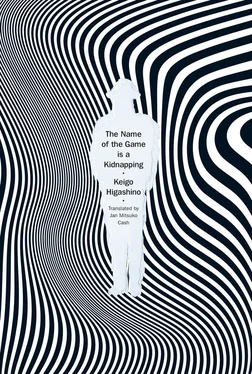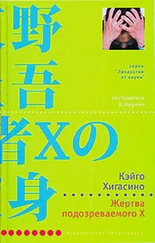No, that was hard to believe. It was a fact that Juri was missing, and if she still hadn’t contacted them, it was only natural to think she’d been kidnapped.
Maybe it was a directive from the police. A police representative had told Katsutoshi Katsuragi, Mr. Katsuragi, let’s go about this calmly. The kidnappers wouldn’t so readily lay a hand on Juri. After all, she’s their important hostage. Things will only get worse if you panic and the press gets word of this. So, Mr. Katsuragi, please go about your day like usual. Please go to your company like usual and work like usual. If something happens, we will contact you. If your wife can stay home, that’s enough. Please leave the rest to us. These kidnappers won’t be making phone calls, anyway — something of that nature.
But it worried me that he was coming to hear about games that we’d handled. What for? Could he have possibly guessed that the kidnapper worked at Cyberplan? There was no way.
As I waited in the reception room turning over various thoughts, a knock sounded and the door opened. The person who opened the door was a female receptionist, but immediately behind her was Katsutoshi Katsuragi.
Katsutoshi Katsuragi sat in an armchair with his legs crossed while he listened to Cyberplan’s presentations. There was a computer with an LCD screen set up in front of him in order to describe each game and its development aims. Of course, these presentations hadn’t been put together on the spot but had been made during the proposal periods. Next to the computer was a game console connected to a small TV that displayed the actual consumer-ready versions. Although a controller was also in front of Katsutoshi Katsuragi, he didn’t reach for it.
Waiting for my turn, I studied his facial expressions. Although he merely glanced at each game with little interest, his questions were pointed and precise. With what aim was this game created, why did you think it would be profitable, did you have any doubts about your sensibility — those kinds of questions were frequent. Some of the staff were unable to answer well and became flustered. Watching the scene, it was hard to believe that Katsutoshi Katsuragi knew that his daughter had been kidnapped.
Eventually, it was my turn. The game I was to introduce was called The Mask of Youth .
It was a game of life, so to speak. The player was involved from the birth of the character. The computer decided, however, the parents you were born to. First, you selected which genes to receive from the mother and father and whether you were a boy or girl. After being born, you proceeded through kindergarten, elementary school, middle school, and so on, and in that time you had to choose how much to study and how much to hang out with which friends. If you assumed that you just needed to think of the future and study, you were falling into a trap. The game’s biggest draw was that the character’s face changed subtly depending on your life experiences.
“There’s something called physiognomy,” I explained to Katsutoshi Katsuragi. “It’s the idea that people’s faces reflect their environments and pasts. For instance, if you scan into a computer the faces of people in a particular occupation and average them, you end up with a face that’s the exact image of someone working in that field. The politician’s face, the banker’s face, and the sex worker’s face really do exist. But your destiny is not dependent on your face. Rather, your face is determined by the path you follow. One thing that makes this game enjoyable is stacking a variety of life experiences to see what face you finally get.”
Katsutoshi Katsuragi opened his mouth. “The issue isn’t your face, is it? To go by your own theory, the face is merely a result. I don’t think people live just to come by this or that face.”
“It’s exactly as you say. That’s why I said it’s ‘one thing’ that makes the game enjoyable. People don’t live in order to get a face — exactly. But in life, your face is important. At various crossroads, your face impacts your destiny. For instance, during job interviews. Or during matchmaking. Among girls trying to become celebrities, quite a few get plastic surgery in their teens. In this game, you’ll be taking on certain crossroads with the face that your life experiences so far have shaped. Those who immersed themselves in their studies and didn’t spend time with people will be emotionally warped, and it will show on their faces. They’ll give a bad first impression and suffer a disadvantage in interviews and dates. You’re responsible for your face — as the old saying goes.”
“So a player who makes the wrong choice and doesn’t get the face he wants just has to give up at that point?”
“In real life, it might be like that. But this is a game. In that situation, there’s a secret weapon. That’s the mask. At crucial moments, the hero can put on a prepared mask. It’s a copy of the player’s face at that point, but then you can modify it to some degree. If your face is anti-social, you can make it look somewhat more sociable. But you can use the mask only a limited number of times, and it can’t be worn continuously. In the end, the player needs to strive to alter the hero’s face. The ultimate goal of the game is to win happiness. In order to do so, the player has to keep exploring what kind of mask he needs.”
I may have gone on for too long. I couldn’t tell how Katsutoshi Katsuragi was taking it and felt anxious. Perhaps he was in no condition to listen to anything too seriously.
“I don’t know if that’s a seller or not,” remarked Katsutoshi Katsuragi, “but it’s an interesting idea. Your experience shapes your face, which determines your destiny. In a sense, that might be the truth.”
“You’re too kind.”
“But I wonder about being able to wear a mask during crucial moments. It might be a useful item for socially awkward youth, but there are times when suffering a setback serves you well. You could even say it’s necessary.”
“But this is a game.”
“Even if it’s a game, making them accept that they weren’t up to it is important,” Katsutoshi Katsuragi said, leaning back in his chair. He locked his fingers on his knees and looked up at my face. “There’s one thing I’d like to ask you.”
“What might that be?”
“Are you responsible for yours?”
I drew a blank for a moment. It was because I didn’t understand his question. “I try to be,” I said.
“So the mask you’d wear to win happiness is precisely the face you have now?”
“Maybe. It’s hard to say.” I faked a smile.
After scrutinizing my mask, Katsutoshi Katsuragi transferred his gaze to Kozuka. “Thank you. Next, please.”
When I got home, Juri was cooking something in the kitchen. I tried to guess what she was making based on the smell.
“Did I have the ingredients to make cream stew?” I asked standing at the kitchen entrance.
Juri was in a shirt and sweats with a t-shirt wrapped around her hips in place of an apron. She was stirring the pot in that getup. “I scrounged through your fridge. Your vegetables were going bad, but I got to them in time.”
I remembered I had bought them intending to make gratin. “You didn’t meet anyone or talk on the phone?”
“Nope. I thought about how I couldn’t let any of your neighbors know I was here, so I even kept the TV volume really low. I even paid attention to the sound of my footsteps. And the phone rang in the afternoon, but I didn’t pick up.”
That must have been my call. For now, it seemed Juri hadn’t messed up.
She was paying attention to the stove’s heat level. I had only used the big pot she was boiling the stew in twice.
Читать дальше









